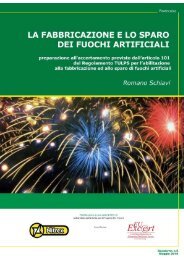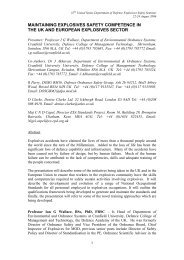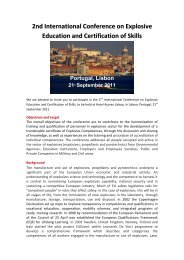Contents of Annexes Annex 1 List of Partners in EUEXcert Annex 2 ...
Contents of Annexes Annex 1 List of Partners in EUEXcert Annex 2 ...
Contents of Annexes Annex 1 List of Partners in EUEXcert Annex 2 ...
You also want an ePaper? Increase the reach of your titles
YUMPU automatically turns print PDFs into web optimized ePapers that Google loves.
Exam<strong>in</strong><strong>in</strong>g the cause <strong>of</strong> explosives accidents <strong>in</strong>variably reveals that human error or failure is a major<br />
contributory factor. The Enschede <strong>in</strong>cident <strong>in</strong> Holland was <strong>in</strong>itiated by a deliberate act by a<br />
malcontent. However the catastrophic consequences were also a result <strong>of</strong> management failure, breaches<br />
<strong>of</strong> the explosives regulations and a failure to understand that stor<strong>in</strong>g fireworks <strong>in</strong>side steel isoconta<strong>in</strong>ers<br />
generates sufficient conf<strong>in</strong>ement to maximise the violence <strong>of</strong> the event.<br />
One <strong>of</strong> the torpedos loaded on the Kursk is known to have been dropped prior to embarkation and this<br />
may be l<strong>in</strong>ked to the torpedo explosion which, the <strong>of</strong>ficial report suggests, led to the loss <strong>of</strong> the<br />
submar<strong>in</strong>e and its crew. In both cases it was the actions <strong>of</strong> <strong>in</strong>dividuals or the failure to act <strong>in</strong> an<br />
appropriate way which contributed to the accident. Had the firework company known how<br />
pyrotechnics might behave under conf<strong>in</strong>ement, would they have used iso-conta<strong>in</strong>ers for storage? Had<br />
personnel on the keyside known about the sensitivity <strong>of</strong> the fuel oxidant system <strong>of</strong> the Kursk torpedos,<br />
would they have been embarked after be<strong>in</strong>g dropped?<br />
Effective explosives safety depends on people mak<strong>in</strong>g the right decisions at the right time. It depends<br />
upon people hav<strong>in</strong>g the necessary competence to carry out their jobs properly. The concept <strong>of</strong><br />
competence is well recognised <strong>in</strong> UK safety management. Much <strong>of</strong> UK safety legislation calls for<br />
“competent people” <strong>in</strong> roles that affect safety. In the case <strong>of</strong> explosives, this will be <strong>in</strong> all stages <strong>of</strong> life,<br />
from the formulation <strong>of</strong> new explosives <strong>in</strong> the laboratory, through manufacture, storage, transportation,<br />
use and disposal.<br />
The MOD and UK position<br />
The MOD has an exemplary record <strong>in</strong> explosives safety. This is <strong>in</strong> part due to the rigor <strong>of</strong> the<br />
regulatory framework that has evolved over many years. It is exempt from the ma<strong>in</strong> civil explosives<br />
Acts <strong>of</strong> 1875 and 1921, but has put <strong>in</strong> place a regime which is at least as rigorous than the civil<br />
legislation. All explosive ordnance enter<strong>in</strong>g service is subjected to classification by a competent<br />
authority and to a safety and suitability for service assessment. Once <strong>in</strong>-service, explosives are stored,<br />
transported, processed and used <strong>in</strong> a highly regulated way. At each stage <strong>of</strong> life explosives will be <strong>in</strong><br />
the custody <strong>of</strong> competent personnel, whilst the ma<strong>in</strong>tenance <strong>of</strong> the regulations and staff<strong>in</strong>g <strong>of</strong> the<br />
assessment process will require a high level <strong>of</strong> expertise. Currently the MOD probably has, or has<br />
access to, sufficient numbers <strong>of</strong> explosives competent personnel to susta<strong>in</strong> all <strong>of</strong> its activities <strong>in</strong>volv<strong>in</strong>g<br />
explosives.<br />
The future however is less certa<strong>in</strong>. Twenty years ago explosives ordnance for UK armed forces was<br />
developed <strong>in</strong> MOD research labs, the explosives were synthesised and manufactured <strong>in</strong> MOD<br />
production facilities. There was a large and expert explosives quality assurance function, the Ordnance<br />
Board and CINO had more than 400 safety specialists to assure safety. In the armament depots and Air<br />
Force bases there was a cadre <strong>of</strong> ordnance and explosives specialists. Another substantial group <strong>of</strong><br />
explosives specialists were employed on the nuclear weapons programme. Many <strong>of</strong> the competent<br />
staff <strong>in</strong> place today derived their experience and competence dur<strong>in</strong>g this period when they had one<br />
employer (the MOD). Most acquired their broad experience by be<strong>in</strong>g encouraged to work <strong>in</strong> the varied<br />
environments which MOD could provide. Many <strong>in</strong> post today will have had experience <strong>of</strong> research,<br />
production, quality, assessment and project management. Today the situation is very different.<br />
Manufacture and production are firmly <strong>in</strong> the private sector and more recently, much <strong>of</strong> the explosives<br />
and ordnance research community has made a similar transition. Nuclear weapons are produced <strong>in</strong><br />
privatised facilities. There is limited movement <strong>of</strong> staff between these different organisations and it is<br />
difficult for MOD to recruit or develop explosives specialists with broad experience.<br />
Whilst the stovepip<strong>in</strong>g <strong>of</strong> organisations <strong>in</strong> the explosives bus<strong>in</strong>ess has had an impact on the breadth <strong>of</strong><br />
experience, the general contraction <strong>of</strong> the explosives bus<strong>in</strong>ess <strong>in</strong> the UK has had a major impact on the<br />
numbers <strong>of</strong> skilled specialists. Added to this many <strong>of</strong> the UK specialists were recruited <strong>in</strong> dur<strong>in</strong>g a<br />
growth period <strong>in</strong> defence science and technology <strong>in</strong> the 1970s and are approach<strong>in</strong>g retirement. A lack<br />
<strong>of</strong> recruitment <strong>in</strong> the late 1970s and 1980s has left a demographic trough, where<strong>in</strong> there are <strong>in</strong>sufficient<br />
skilled explosives specialists to replace those who will be leav<strong>in</strong>g government service <strong>in</strong> the next few<br />
years.<br />
European Union<br />
28













